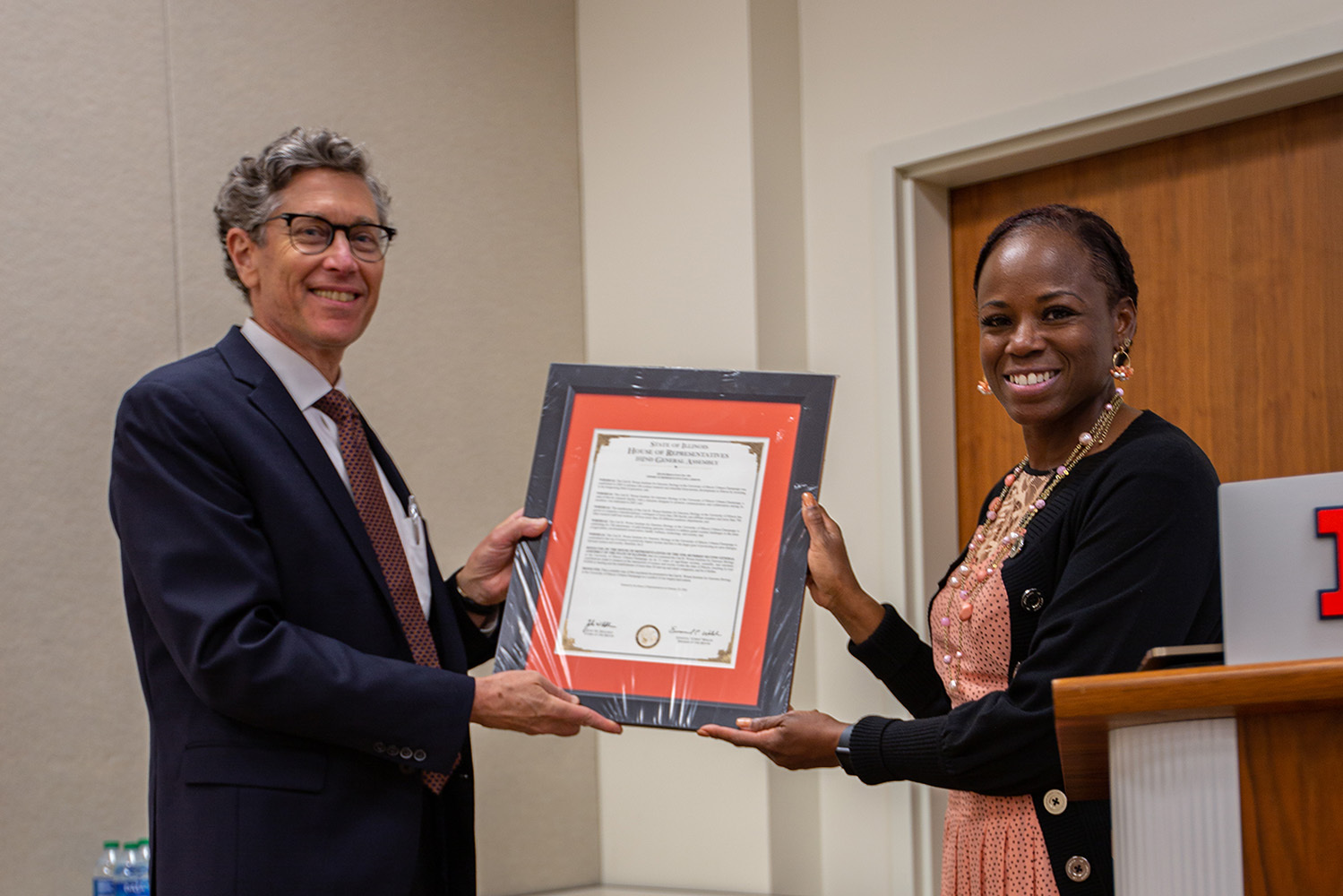Illinois General Assembly recognizes IGB’s 15th anniversary

On February 25th 2022, the Illinois General Assembly adopted House Resolution 0690, commending the Carl R. Woese Institute for Genomic Biology on its 15th year of societal, scientific, and scholarly contributions at the intersection of science and society.

The IGB was established in 2007 with the goal of advancing life science research and stimulating bioeconomic development in Illinois through genomics. The state-of-the-art research facility has a unique structure that is designed to promote communication and collaboration among its members.
Over the past 15 years, the IGB has grown to include more than 200 faculty and affiliate members and more than 700 research staff and students, all from 40 departments across the University of Illinois. With over $520 million in funding and the establishment of more than 20 start-up and small companies, the institute has carried out its mission to address grand societal challenges in the areas of agriculture and environment, health and wellness, technology, and society. Additionally, IGB continues to pursue its goal to promote open dialogue between science and society.
On June 14th, IGB welcomed State Representative Carol Ammons, who serves the Illinois 103rd district. Ammons presented Gene Robinson (GNDP), the IGB Director and Swanlund Chair in Entomology, a copy of the resolution as a symbol of the General Assembly’s respect and esteem.
“It is important to understand the role that genomic biology plays in solving today’s pressing problems,” Ammons said. “Without the IGB and SHIELD, COVID-19 would have been much more difficult to handle. We depend on the research you provide and recognize this institute and its ability to solve humanity’s problems.
After accepting a copy of the resolution, Robinson highlighted two programs that exemplify the benefit of addressing scientific and societal goals in concert: STEAM Transdisciplinary Research Across Institutional Near-peers or STEAM TRAIN and Illinois Biological Foundry for Advanced Biomanufacturing or iBioFAB.
The former grew out of partnerships with Franklin STEAM Academy Middle School in Champaign and University Laboratory High School in Urbana. STEAM TRAIN empowers middle school students to conduct independent research projects, over the course of a school year, in consultation with near-peer mentors from Uni High and researcher volunteers from the IGB.
Zanne Newman, teacher and Franklin Magnet Site Coordinator, and IGB researchers Ed Lochocki and Facundo Fernandez-Duque shared their experiences with the effort. “We can teach kids how to be a scientist in real life: how to come up with a hypothesis, how to communicate, and how to explain why the project is important,” Lochocki said. “After working with them, I can say that the future of research is in great hands."
"As I think about IGB's goal to promote an open dialogue between science and society, I am reminded of the achievements of Alice Ball," said Ammons. "Alice Ball was an African American chemist who developed an injectable oil extract that was the most effective treatment for leprosy until the 1940s. The solutions to humanity's various problems can emerge from untraditional places. Having different voices and perspectives be a part of the scientific community is so important."
Robinson also described iBioFAB, which was developed under the leadership of Huimin Zhao (BSD/GSE leader/CABBI/CGD/MMG), Steven L. Miller Chair in Chemical Engineering. iBioFAB is a precisely engineered set of robotic components combined with a highly adaptable software platform. It can reliably perform what would otherwise be those countless hours of error-prone labwork: handling reagents, incubating reactions or living cells, synthesizing products, applying treatments, and monitoring outcomes. The platform can support a broad array of research goals, from developing microbes that can sustainably produce vital bioproducts, strains of yeast that can make better biodiesel, fabricating biological molecules that could become new medical therapeutics, to rearing honey bees in a controlled environment for agricultural research.
“iBioFAB highlights the potential of team-based research to achieve goals that would be unreachable for the individual, as well as the power of genomics to effect positive societal change over diverse arenas,” Robinson said. “Only in an interdisciplinary environment such as the IGB could such a system be not only conceived, but successfully constructed, implemented, and used to the realization of its full potential.”
